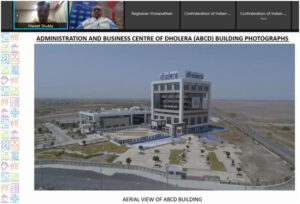AHMEDABAD, JULY 31
The Confederation of Indian Industry (CII) Gujarat hosted the second edition of its Sustainable Mobility Conference on Friday and brought together leading industry players, policy experts, and decision-makers to deliberate on measures that can help speed up the adoption of electric vehicles.

The virtual conference on ‘A New Era of E-Mobility’ was organized in association with Gujarat as the Partner State, Society of Manufacturers of Electric Vehicles (SMEV) as Partner Association, and KPMG as the Knowledge Partner.
In his address, Hareet Shukla, IAS, MD, Dholera Industrial City Development Limited, said the Gujarat Industrial Policy 2020 and the Gujarat Electric Vehicle Policy 2021 make Gujarat an attractive destination for the manufacturing sector, especially for the EV segment. He also spoke about Dholera, a new city being built 110-km from Ahmedabad, which he said is an ideal destination for setting up manufacturing projects.
In his comments, Randheer Singh, Senior Specialist at Niti Aayog, said, “The time is right for the country to make the shift to a cleaner mode of transport and reduce carbon emissions. The government of India has taken several steps to accelerate the adoption of EVs. The government has approved the PLI scheme for advanced chemistry cell battery storage programme and remodelled the FAME 2 scheme to make it more effective.”
Demand for electric vehicles is on the rise as countries make a push towards lower greenhouse gas emissions. India is also encouraging the development of the EV industry and has announced a host of policies to encourage investments in EV and related businesses. Last month, the Centre launched a revamped Faster Adoption and Manufacturing of Hybrid and EV (FAME II) scheme to subsidize EVs and extend it until March 2024. Many states, including Gujarat, have also announced subsidies on EVs to bring down the initial cost and make them affordable and appealing to more buyers.
“Solutions that can help us lower greenhouse gas emissions are a must to slow down the pace of climate change. Considering the high share of the transportation sector in the emissions, electric vehicles have an important role to play in lowering emissions,” said Vinod Agrawal, Chairman, CII Gujarat, in his introductory remarks.
Raghavan Viswanathan, director at KPMG India, said India has a strong incentive to push for EVs due to high pollution levels across cities and the high annual oil import bill of upwards of $100 billion.
“The PLI scheme has been announced to boost manufacturing in the EV sector, and I believe it will be a key driver. However, it will have a greater impact if the enabling infrastructure that is required for EV is in place,” he said.
Tarun Mehta, CEO and Co-founder of Ather Energy, said the EV industry is at an “incredibly exciting” place.
“We are seeing a big push towards EVs from the Centre and states. Measures such as decreasing taxation on EVs and increasing subsidies on them will encourage more people to choose EVs. There is an opportunity like never before,” he said.
Piyush Tamboli, Past Chairman of CII Gujarat, noted that an estimated 5 million electric vehicles are expected to be on the roads by 2025, but most of these will be two-wheelers.
“The entry of a large number of EV players is a positive sign and indicates the segment’s impending growth,” he said, stressing the need for setting up charging infrastructure, securing supply chains, and addressing raw material issues.
A panel discussion was also organised as a part of the conference. Ramesh Dorairajan, Head of Sales, Marketing and Customer Care (Electric Vehicles) at Tata Motors; Mehul Shah, VP, Transport Business Unit at Exide Leclanche Energy; Sharif Qamar, Fellow & Area Convenor, Centre for Sustainable Mobility, TERI; Shwetal Shah, Technical Advisor, Climate Change Department, Government of Gujarat; Ravi Nambair, President, International Business, Wardwizard Innovations & Mobility, and Dharmendra Mishra, Group Executive Director at Kataria Group took part in the panel discussion and shared their insights into the EV market. The panel discussion was moderated by Jeffry Jacob, Partner, Business Consulting, KPMG.












